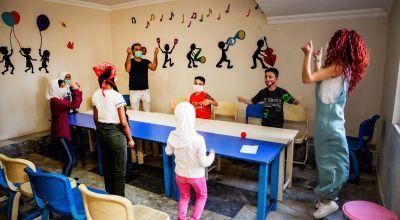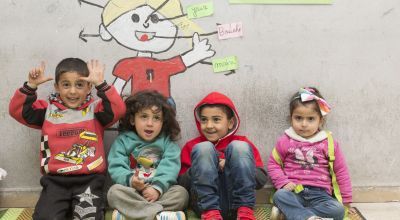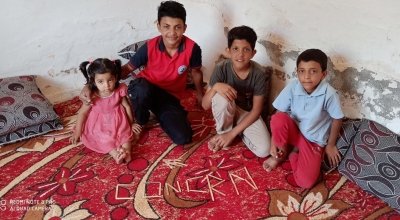
Read our 2024 annual report

Knowledge Hub
Over the last 11 years, Syrian children have been forced to grow up far too quickly.
For millions of them, the ongoing crisis has been the only reality they’ve known. Playing happily without the constant threat of bombs or missiles, child labour, or recruitment into the war are foreign concepts.
Or they have spent much (if not all) of their young lives in displacement, many in informal settlements that are more shelter than home. In Syria and abroad, Syrian children face a unique set of difficulties.
Here are five of those challenges, broken down - plus information on how Concern is helping.
1. Children in Syria face the traumas of conflict
War is traumatising enough no matter the age, but it hits children especially hard. Children are still developing emotionally and mentally and lack the experience and resources that adults often have to navigate trauma.
Whether they’re still in Syria or are being temporarily hosted as refugees in a different country, Syrian children live with a great deal of uncertainty.

In 2017, when Concern published Shattered Lives, a report on protecting civilians in war-torn Syria, figures for internal displacement within Syria showed that some families had relocated as many as 25 times since 2011.
This on its own carries an impact, but often the events triggering those relocations are even more traumatising.
For Shattered Lives, we spoke with Layal* who, at the time, was 11 and the eldest of four. When our team met her in northern Syria, she was supported by relatives but had assumed responsibility for her younger siblings after witnessing the deaths of both her parents.
Despite her tender age, she was focused on the future of her brothers and sister, more so than her own, the question of which made her confused and despondent. “It’s so far away, the future,” she told us. “I mean, now I am 11 years old and I don’t know what I will do when I am 12 years old.”
“When children grow up in armed conflict, their deep mental scars are often overlooked,” UNICEF Executive Director Henrietta H. Fore said at a 2018 conference in Berlin. “Prolonged exposure to violence, fear and uncertainty can have a catastrophic impact on children’s learning, behaviour and emotional and social development for many years.”
All of this adds up to the sense of a “lost” childhood for those who have to grow up too quickly in order to survive.
2. …while Syrian refugee children may face continued emotional distress
For Syrian children who are able to get out of the country, the trauma may continue. Displacement can further affect the mental health of children, leaving them to develop a number of unhealthy coping mechanisms in response to their heightened vulnerability.
In one of Concern’s psychosocial support programmes for Syrian children, Eslem*, a 13-year-old girl who has lived in Turkey for the last seven years, spoke often of her home and how its appearance affected her emotionally.
"The house looked like a ruin,” she told us, adding that she felt bad when her friends came over and asked why they didn’t paint the house. “I want a new life,” she said in another session. “I want to have a white house.”
Eslem’s feelings about her home and how it impacted her broader mental wellbeing shows the critical and important role the home plays in a child’s life, as well as one of the ways that safety can still feel less than safe.
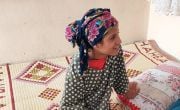
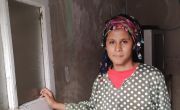
3. Child labour and early marriage have become increasingly common for Syrian children
Over the last 11 years, many families - including those living in host communities, but especially those still in Syria - have faced a precarious financial situation, leading to desperate measures taken with their children. Two of the main risks in these situations are child labour and early marriage.
In one discussion for Shattered Lives, a man told us he knew of a 7-year-old child who had taken work lubricating and greasing cars: “A job that is too tiring for a child of that age, and I cannot do anything to help him.”
It’s sadly common for young boys to work in machinery or industry sectors, or to take menial jobs like street vending, waste collection, carpentry, or construction (or, in rural areas, agriculture). Girls may be seamstresses, or take on traditionally degrading work, like carpet cleaning or being a house servant.
Girls are also more likely to marry at an early age in order to decrease the financial burden on their families and to have more security as married “women.”
In 2013, Shiya* told Concern that one of the hardest parts of leaving Syria was saying goodbye to her 14-year-old daughter, who had just been married the year before. “She married too young,” Shiya conceded. “But because of the war, we decided together as a family that it was better for her to get married and be protected.”
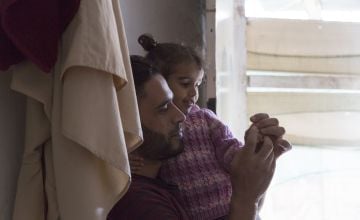
4. Syrian children have also participated in the conflict
Child marriage hasn’t been exclusive for girls during the Syrian crisis. A refugee and mother of four, Nour* became the guardian of her 16-year-old nephew after her brothers were killed and her sister was kidnapped.
She married him to a 15-year-old girl in the hope that he could start a family and not be recruited by armed groups. When considering the alternative, early marriage seemed like the lesser of two evils.
Young Syrians are often unaware of the risks and causes of conflict. In some cases, youths voluntarily joined armed groups because they believed in the cause, or they wanted a sense of community and belonging after losing their loved ones to the war.
In the opposite of Nour’s case, some children were convinced by their families to join for protection, prestige, or money. Syrian women, in a focus group led by Concern, suggested that broadcasting more entertainment programmes on TV, and providing more recreational support could help to divert young people from taking up arms. By providing meeting and recreational places and facilitating recreational and education activities, children could also be discouraged from taking part in conflict.
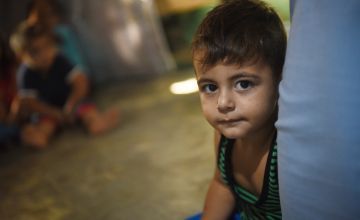
5. Without an education, Syria risks a “lost generation”
As we note in our Syria crisis explainer, the war has directly affected children’s access to education in Syria.
Before the war, Syria had a high attendance rate for primary school - 97% - but education was halted by conflict as it remained unsafe for children to go to school.
A March 2019 report by UNICEF suggesed that 40% of Syria’s school infrastructure had been destroyed in the conflict, creating huge gaps in the provision of education, and adverse protection risks.
For Syrian refugee children, there are also barriers to education. The emotional toll of conflict, trauma, and asylum-seeking has left many children simply not ready to enter a formal classroom, and many others end up working in order to help families make ends meet. Language barriers often leave children falling behind; even in Arabic-speaking countries, the dialects can vary greatly.
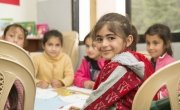
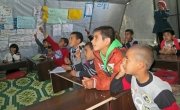
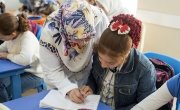
Syrian children: Your concern in action
During the formative years, it is critical that a child is exposed to friendships, familial love, and a safe environment. However, for many Syrian children, this is not the case.
The traumas of war have the ability to affect a child’s development both mentally and socially. Concern’s work with child wellbeing seeks to promote and improve mental health by providing children a safe environment to play and feel safe, while also working with parents and caregivers to help them find parenting techniques that are sensitive to what their children have experienced.
Our education programme in northeast Syria aims to give out-of-school and conflict-affected children access to quality primary-level education, providing support in both non-formal education centres and formal schools.
In 2020, this effort reached nearly 6,000 students. Despite the challenges posed by COVID-19, we were still able to expand our programme by opening two new non-formal education centres (bringing the total to six), rehabilitating seven primary schools, and beginning our first homework support component in formal schools to help support pupil retention.
Our Building Tomorrow programme provided education and livelihoods support for Syrians under temporary protection in four provinces in southeast Turkey and reached over 13,500 people in 2020.
The education element of the programme has been implemented at 30 public education centres (PECs) and 20 vocational and technical high schools (TVETs). Since language barriers impede progress, the programme provides Turkish language classes to 12,000 children at PECs, between the ages of 6 and 13.
It also seeks to improve access to formal educational opportunities for school-aged Syrians under temporary protection through outreach, learning-support programmes, and the provision of learning and psychosocial support materials.
*Names have been changed for security purpose


